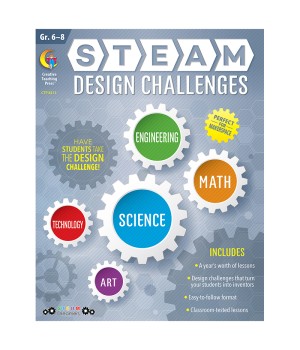Your shopping cart is empty!

STEAM Design Challenges Resource Book, Grades 6-8
| Product Code: | CTP8213 |
| Availability: | You get it / pickup 2-3 weeks |
Price: $30.23
Qty:
- OR -
Add to Wish List
Add to Compare
Perfect for Makerspace and STEM programs! This teacher resource book for 6th, 7th, and 8th grades includes:
A year's worth of teacher lesson plans
STEAM design challenges that turn middle school students into inventors
Easy-to-follow lesson format (with standards identified for each lesson)
Classroom-tested lessons
The STEAM Design Challenges in this 152-page book follow engineering practices to teach students in Grades 6-8 to solve a problem by designing, creating, and justifying their designs. They also allow art to support and enhance the learning of science and math while the engineering process is followed.
These engaging STEAM lessons:
Integrate the Next Generation Science Standards and national standards from other disciplines
Enhance learning across various disciplines
Facilitate students in collaborating to solve real-world scenarios
Promote critical thinking, analytical thinking, and reflective thinking
Incorporate the Five E's Instructional Model (engage, explore, explain, elaborate, evaluate)
Are classroom tested
Engineering Design Process
The lessons in this book are intended to support the engineering design process in which teachers become a facilitator by encouraging and guiding students to work as a team to find a creative solution to a real-world problem without providing step-by-step instructions. Students are inspired to act as scientists and engineers through the use of sketches, diagrams, mathematical relationships, and literacy connections. By creating their very own models and products based on background information from their studies, students are immediately engaged through a meaningful, rewarding lesson.
More about the lessons
Each lesson begins by presenting students with a design challenge scenario in order to immediately excite students with a real-world situation that they are on a mission to solve. Students are then given a dilemma, mission, and blueprint design sheet and are asked to collaborate with team members to create several prototypes. Students present their prototypes to their teacher, construct their design, test their design, engage in a class discussion about their design, and then modify their design. Finally, teams create a justification piece in order to sell their new prototype (ex. persuasive letter, video, advertisement etc.).
